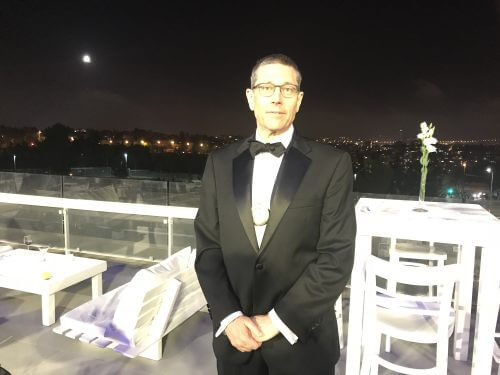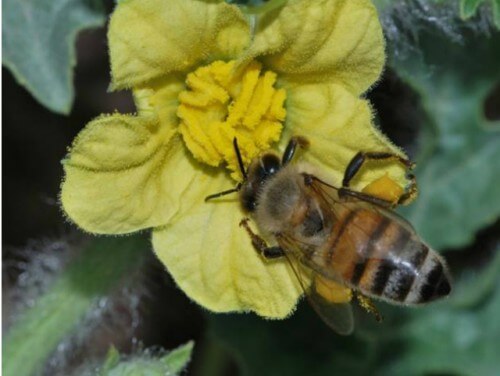"RFID technology makes it possible to mark each bee, and tracking is done automatically using a computer that analyzes what it sees in the cameras with the help of machine vision and artificial intelligence algorithms." Prof. Robison says in an interview with the Hadaman website, and describes that he entered the field of beekeeping by chance, when he volunteered at Kibbutz Beit Hashita

Prof. Gene Robinson from the University of Illinois and winner of the Wolf Prize for Agriculture for deciphering the bee genome at the beginning of the genome era. He researches bee societies and even individual bees and mobilizes his laboratory resources to fight hive collapse syndrome and the disappearance of bees.
The Wolf Prize is given for excellence and a unique contribution to science and it is not necessary that the winners of the prize have any connection to Israel, but by chance, the subject of his research for the past forty years owes Prof. Robinson to Israel.
"My relationship with the honey bee began when I was a volunteer at Kibbutz Beit Al-Hasita in 1973-1974. I worked in several branches on the kibbutz, for example in the vineyard, and I knew nothing about bees, but one day I was asked to accompany Yussef Gedron, the chief beekeeper who was one of the founders of the kibbutz and a former member of the Palmach. It was an experience to learn about bees from him, and I have been working with bees ever since. When I returned from the kibbutz, I decided to continue in the field in academia. I studied in this field for my three degrees at Cornell University."
As we know, bees are a social insect, and it turns out that even among the working bees there is an internal division of labor. The division of labor was made possible by evolutionary traits usually associated with human societies: agriculture, war, and symbolic language.
How do the bees do this with such a small brain?
This is one of nature's great mysteries: how did honey bees achieve such complex features with such a small brain? There is a division of labor - different bees do different jobs and specialize in a certain action, and there is a coordination between the different roles among the individuals in the company, that's why as a collective they can act together. In the research we discovered which genes in the brain enable them to divide this work.
RFID technology allows each bee to be marked, and the tracking is done automatically using a computer that analyzes what it sees in the cameras with the help of machine vision and artificial intelligence algorithms. The possibility of studying individual bees with barcodes and microchips is the new frontier of the field. This technology makes it possible to know how each individual behaves and what are his relationships with society. Humans have great differences and everyone deals in areas in which they are experts. Now we can know how each bee develops and what is the division between heredity and environment.
A book about the bee genome project?
The project took place in the years 2002-2006. This was in the early days of genome decoding, and decoding the genome of a bee cost a million dollars at the time (for comparison, today it costs a hundred dollars and does not require experts). Seventy scientists from all over the world analyzed the genome so that we can gain insights into how sociality is coded in the genome.
One of the first discoveries made following the decoding of the honey bee genome is that bees have epigenetics. We discovered that the honey bee is the first insect in which an epigenetic system was found similar to that found in mammals and humans that regulates gene activity in response to the environment. This was an important discovery, because only a few years earlier my laboratory was the first to show that the social environment has an effect on gene activity - almost 50% of genes are sensitive to the social environment, meaning that their expression is influenced by the environment. This discovery was one of the foundations of the science of sociogenomics.
Coincidentally, at the same time as the publication of the article on the honey bee genome in Nature in 2006, the colony collapse syndrome or as it is popularly called "the bee queens" began to be felt around the world.
We have used genome decoding for sociogenomics, others have used it to solve the problem of colony collapse. The genome provided an important source of information for investigating the phenomenon. It is important to say in this context that we are making great progress in understanding the source of the problem, although not yet a solution. This is actually a phenomenon made up of four factors, the combination of which caused the disruption of communication among the bee colony and its collapse. The causes are spraying, parasites, pathogens and poor nutrition.
"There is still a lot of work and now that we have begun to investigate their individual communications, we will be able to add insights that will help find the solution. One of the candidates to be the cause of the collapse of the hives is an anti-fungal pesticide - it is a substance that kills harmful fungi but not insects, but if the bees are infected with any virus, they are also exposed to the spray, which would not have harmed them if they were healthy."

What can we learn from bees about human societies?
First, you have to be very careful and understand that bees are not small people and people are not big bees. However, we published an article a few months ago when we discovered that there are socially irresponsible bees. We discovered that the activity of the genes in their brain is different from that of other bees that respond to signals from the society around them. When we compared this genome to the genome involved in autism, we found a lot of overlap: the same genes that are expressed in the lack of social involvement of bees, are also expressed in autism in humans. Of course, this does not mean that these bees are autistic. This means that there are networks of genes that involve (express) a lack of social involvement and those genes are used repeatedly in the evolution of social traits.
As mentioned, not every social trait of the bees must have a counterpart in humans. In the end the evolutionary distance, or the common ancestor of man and bee was unicellular. Social organization develops independently along different paths that led to man and those that led to social insects. However, it is probably an important feature because it has been preserved throughout evolution. Within these limitations we can learn about the similarities between the bees and humans and also about the differences between them.
In your lecture you mentioned the Faculty of Agriculture in Rehovot and the Hebrew University in Jerusalem, when were you there?
The first long stay was in a kibbutz in my youth. The second, when I was already a doctoral student at Cornell, I spent a year as a fellow in the Faculty of Agriculture (1982-1983). A decade later, I researched for a year in Prof. Hermona Sorek's lab at the Hebrew University - it was my first sabbatical as a professor, and I did it with the help of a Fulbright scholarship. I was lucky to be in Israel quite a few times and three long stays.
What is your reaction to your winning the Wolf Prize?
"I was excited and honored. The Wolff Award is known throughout the world for reaching extraordinary achievements and to be part of the distinguished group of recipients of this award and to receive recognition for this is the honor of my life. I was also happy that the bees were recognized. This is the first Wolf Prize given to someone who studies bees, I see it as an honor for me and a means of recognizing the importance of bees to agriculture and the world at large."
- More on the subject on the science website
-
The phenomenon of the bee queens is also coming to Israel (2007)
Billions of bees have not returned to their hives in the last six months (Article from April 2007)
